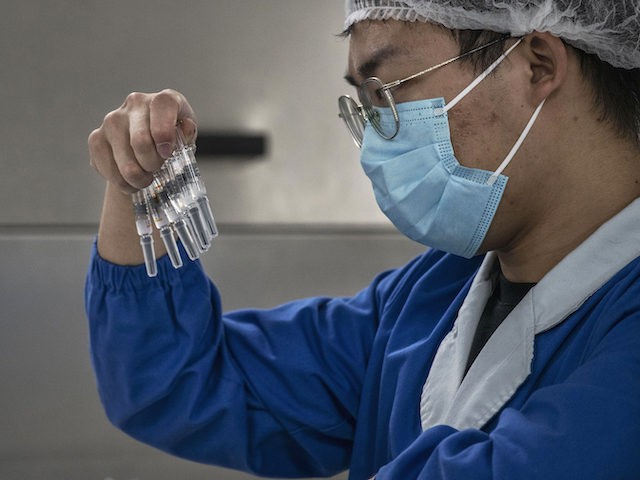An in-depth report published by the Peruvian investigative outlet Ojo Público on Tuesday revealed extensive evidence that at least four Latin American nations — Peru, Argentina, Chile, and Mexico — used spare doses of Chinese-made coronavirus vaccines to immunize politicians and celebrities.
The report documented evidence that Chinese pharmaceutical firms made deals with the countries for them to host clinical trials of their products, but sent significantly more doses — sometimes thousands more — than necessary for the trials. While not all doses are unaccounted for, Ojo Público found evidence that high-ranking political officials and their relatives received some of the doses prior to the governments’ health oversight organs approving the vaccine products for public use.
In Mexico, the government used some of these doses to immunize legendary singer Vicente Fernández — who, at 81 years old, is at high risk for Chinese coronavirus complications — and his son, pop star Alejandro Fernández.
The Chinese firms identified in the report are the two with the most prominent vaccine products on the international market — Sinovac and Sinopharm — and a third, Cansino. Sinovac’s product, “Coronavac,” is the one most widely distributed of the three internationally today. Its efficacy rate following clinical trials stood at only 50.38 percent — the approval threshold is 50 percent — and mass vaccination campaigns using the Sinovac product have preceded large spikes in coronavirus cases in Chile and Mongolia. Seychelles had a similar experience with Sinopharm, whose protect allegedly tested at 78.1 percent effective. Cansino’s product, which only requires one dose, tested at 65.7 percent efficacy, according to the pharmaceutical firm.
All three have significantly lower efficacy rates documented than the American vaccines produced by firms Pfizer and Moderna, both of which tested at over 90 percent efficacy in preventing coronavirus infections following two doses.
“The Chinese laboratories Sinopharm, Cansino, and Sinovac sent thousands of extra doses of their experimental vaccines to countries in Latin America … an analysis based on a data set compiled by Ojo Público using the information from four countries revealed,” the outlet noted Tuesday. “Although the studies in Argentina, Chile, and Peru required 24,000 vaccines [doses] to administer to volunteers, the customs registry reveals China sent over 13,500 extra doses,” or 55 percent more than necessary.
The Peruvian outlet cited “a lack of transparency on the part of the Mexican government” for its inability to confirm the total number of extra doses sent to Mexico, believed to have been shipped by Cansino. It noted that local Mexican media had already revealed the widespread illicit use of Chinese-made vaccines by “public officials, artists, and their families” occurring simultaneously with the Cansino trials. The names of those vaccinated illicitly in Mexico, including Vicente and Alejandro Fernández, appeared on a document listing 40 people who received the experimental vaccine; Ojo Público affirms that anonymous sources at Mexico’s Exterior Relations Department confirmed the authenticity of the document and that such vaccinations could not have occurred without the approval of Foreign Minister Marcelo Ebrard.
In Chile, the Peruvian outlet confirmed the shipment of extra doses with the firm contracted to help conduct Cansino’s clinical trials, Bopal SA. The firm insisted the extra doses were “stockpiled” and unused. Cansino reportedly offered the extras to those helping administer the clinical trials.
Argentine officials similarly claimed that their extra doses had been stockpiled. Unlike Chile, however, local media had already revealed that the socialist government of President Alberto Fernández had vaccinated a long list of politicians, relatives, and friends clandestinely, before health authorities had made such vaccinations legal. The incident is now known as the “VIP vaccine” scandal and led to the resignation of the health minister and protests against the federal government attracting thousands of people. The “VIP vaccine” scandal is believed to not have primarily involved Chinese-made products, however, but the Russian vaccine candidate “Sputnik V.” Widespread use of Sputnik V also preceded a surge in cases in the country.
Peru experienced its own “VIP vaccine” scandal in early 2021, this one tied to illicit administrations of doses of the Sinopharm vaccine candidate. Foreign Minister Elizabeth Astete and Deputy Health Minister Luis Suárez Ognio both resigned in February after admitting that they had received illegal doses, two of among nearly 500 government officials and their families and friends who received vaccine doses without official approval.
Ojo Público confirmed that Astete and former Health Minister Pilar Mazzetti received the doses from a cache of 3,200 additional doses sent to Peru in September 2020 as part of a deal to conduct clinical trials. Prior to her resignation, Mazzetti had vowed that she would be among the last in the country to be vaccinated. Martín Vizcarra, the former Peruvian president ousted by Congress last year, and his wife also allegedly received doses from this cache.

COMMENTS
Please let us know if you're having issues with commenting.